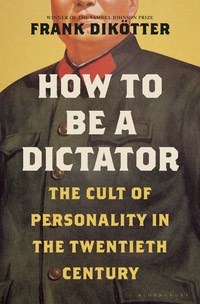“Essential reading … The standalone portraits of his eight dictators are riveting” – Justin Marozzi, Evening Standard, 'Book of the Week’
“How to be a dictator? Ruthlessness matters a lot more than talent, but luck most of all. That is the upshot of Frank Dikötter's elegant and readable study of the cult of personality in the 20th century … [Dikötter's] penmanship and eye for anecdote brings [the dictators] to life” – The Times
“A brilliant study of twentieth-century dictatorship … The book's psychological insight is devastating, the stories are eye-popping … Essential reading for any student of political manipulation, as a study of man's inhumanity to man, it's almost unbearably moving” – Sue Prideaux, New Statesman, Books of the Year
“A whistlestop tour of some of the most infamous leaders of the 20th century … What Dikötter does so well is to find the pathological and ideological connections among leaders who “teetered between hubris and paranoia”” – Observer
“Frank Dikötter provides a timely reminder of just how destructive toxic insecurity, and its corollary, pathological narcissism, can become … In terms of the dynamics of narcissistic authoritarianism, there is much in How to Be a Dictator that is of critical contemporary relevance … History only makes sense if we understand the psychological pathology that underlies it, and our own propensity for partaking in such pathology. We need a clear-eyed understanding of history as a recurring series of monumental follies, led by cretins who duped or forced millions of us into humiliating childish submission. Only then can we hope to avoid the repetition. Dikötter is in the vanguard of historians opening our eyes to this fundamental truth” – Irish Times
“Enlightening and a good read” – Spectator
“Worryingly close to home … Dikötter has put together sharp portraits of Mussolini, Hitler, Stalin, Mao, Kim Il-sung, Duvalier, Ceausescu and Mengistu” – Times Higher Education
“How to Be a Dictator is a timely book and enjoyable to read. It is strangely comforting to be reminded that many of the dictators in Dikötter's book came to an ignominious end. But that is no excuse for underestimating the need to protect democracy today” – Financial Times








